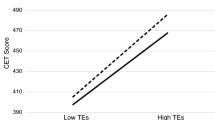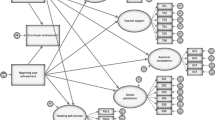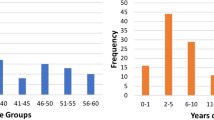Abstract
This study aimed to explore and compare individual student-level and teacher-level teacher expectation effects on student academic achievement in the Chinese junior high school context. The participants were 50 teachers and their 1199 students from 10 junior high schools. With differences in student baseline achievement controlled, hierarchical linear modelling was employed to see if early-year teacher expectations predicted student year-end achievement. Results showed that both student- and teacher-level expectations (relative to achievement) positively predicted student academic achievement. Teacher expectations at the student level showed a stronger influence on student-achievement outcomes. The results also indicated that teachers tended to hold higher expectations for girls than for boys and were more likely to underestimate students who were children of migrant workers.
Similar content being viewed by others
References
Alvidrez, J., & Weinstein, R. S. (1999). Early teacher perceptions and later student academic achievement. Journal of Educational Psychology, 91, 731–746. https://doi.org/10.1037//0022-0663.91.4.731
Archambault, I., Janosz, M., & Chouinard, R. (2012). Teacher beliefs as predictors of adolescents’ cognitive engagement and achievement in mathematics. The Journal of Educational Research, 105, 319–328. https://doi.org/10.1080/00220671.2011.629694
Babad, E. (1993). Teachers’ differential behavior. Educational Psychology Review, 5, 347–376. https://doi.org/10.1007/bf01320223
Bliese, P. D. (2000). Within-group agreement, non-independence, and reliability: Implications for data aggregation and analysis. In K. J. Klein & S. W. J. Kozlowski (Eds.), Multi-level theory, research and methods in organizations: Foundations, extensions, and new directions (pp. 349–381). Jossey-Bass.
Brophy, J., & Good, T. L. (1974). Teacher–student relationships: Causes and consequences. New York, NY: Holt, Rinehart and Winston.
Brophy, J. E. (1983). Research on the self-fulfilling prophecy and teacher expectations. Journal of Educational Psychology, 75, 631–661. https://doi.org/10.1037/0022-0663.75.5.631
Brophy, J. E. (1985). Teacher-student interaction. In J. B. Dusek, V. C. Hall, & W. J. Meyer (Eds.), Teacher Expectancies (pp. 303–328). Lawrence Erlbaum.
Brophy, J. E., & Good, T. (1970). Teachers’ communication of different expectations for children’s classroom performance: Some behavioral data. Journal of Educational Psychology, 61, 365–374. https://doi.org/10.1037/h0029908
Browne, W. J. (2017). MCMC Estimation in MLwiN v3.00. Centre for Multilevel Modelling: University of Bristol.
Charlton, C., Rasbash, J., Browne, W. J., Healy, M., & Cameron, B. (2017). MLwiN Version 3.00. Centre for Multilevel Modelling: University of Bristol.
Du, A. (2016). Xuesheng zhijue dao de wuli jiaoshi qiwang yu qi xuexi chengji de guanxi yanjiu [A study on the relations between physics teachers’ expectations and students’ academic performance]. Zhongxue Wuli Jiaoxue Cankao, 45, 2–6.
Dusek, J. B., & Joseph, G. (1983). The bases of teacher expectancies: A meta-analysis. Journal of Educational Psychology, 75, 327–346. https://doi.org/10.1037/0022-0663.75.3.327
Fan, L., & Jin, S. (2008). Jiaoshi qiwang dui chuzhongsheng xinli tedian de yingxiang [Influences of teacher expectations on the psychological characteristics of junior middle school students]. Xinli Fazhan Yu Jiaoyu, 24, 48–52.
Flanagan, J. C. (1960). Tests of general ability: Preliminary technical report. Science Research Associates.
Friedrich, A., Flunger, B., Nagengast, B., Jonkmann, K., & Trautwein, U. (2015). Pygmalion effects in the classroom: Teacher expectancy effects on students’ math achievement. Contemporary Educational Psychology, 41, 1–12. https://doi.org/10.1016/j.cedpsych.2014.10.006
Gan, L. (1993). Chuzhong jiaoyu de jichu diwei he gaige silu [The basic position of junior high school education and its reform thinking]. Jiaoyu Pinglun, 6, 66–67.
Gao, J. (2013). Jiaoshi qiwang yu chuzhongsheng yingyu chengji zhi guanxi tanjiu [An exploration into the relations between teachers’ expectation and students’ English achievements in junior middle schools] (Master’s thesis, Shandong Normal University, Jinan, China). Retrieved from http://oversea.cnki.net/kcms/detail/detail.aspx?recid=&FileName=1013215861.nh&DbName=CMFD2013&DbCode=CMFD
Gao, L., Zhang, Y., & Zheng, H. (2014). Chuzhongsheng ziwo gainian, shisheng guanxi, jiaoshi qiwang yu xueye chengji de guanxi [Relations between junior high school students’ self-concept, teacher-student relationship, teacher expectations and student academic achievement]. Chuzhou Xueyuan Xuebao, 16, 67–69.
Ge, S. (2017). Jincheng wugong zinü de xuexiao jiaoyu wenti ji duice yanjiu [A study on school education of migrant children and countermeasures]. Sheke Xuelun, 29, 159–161. https://doi.org/10.16400/j.cnki.kjdkz.2017.10.075
Gill, J. (2002). Bayesian methods: A social and behavioral sciences approach. Chapman and Hall.
Gill, S., & Reynolds, A. J. (1999). Educational expectations and school achievement of urban African American children. Journal of School Psychology, 37, 403–424. https://doi.org/10.1016/S0022-4405(99)00027-8
Good, T. L. (1987). Two decades of research on teacher expectations: Findings and future directions. Journal of Teacher Education, 38, 32–47. https://doi.org/10.1177/002248718703800406
Good, T. L., & Brophy, J. E. (1997). Looking in classrooms (7th ed.). Longman.
Hinnant, J. B., O’Brien, M., & Ghazarian, S. R. (2009). The longitudinal relations of teacher expectations to achievement in the early school years. Journal of Educational Psychology, 101, 662–670. https://doi.org/10.1037/a0014306
Huang, Z., Li, Y., & Wan, R. (2010). “Qu neijuanhua”: Ronghe jiaoyu de guanjian—Jincheng wugong renyuan zinü ronghe jiaoyu de xianzhuang yu duice [“De-involution”: Key to the confluent education of migrant workers’ children in the city]. Jiaoyu Yanjiu, 11, 18–24.
Jia, Z. (2012). Jiaoshi qiwang dui zhongxue yingyu ketang shisheng hudong de yingxiang [The influence of teacher’s expectation on teacher-student interaction in junior English classroom] (Master’s thesis, Shanxi Normal University, Linfen, China). Retrieved from http://oversea.cnki.net/kcms/detail/detail.aspx?recid=&FileName=1012340677.nh&DbName=CMFD2012&DbCode=CMFD
Jussim, L., & Eccles, J. S. (1992). Teacher expectations: II. Construction and reflection of student achievement. Journal of Personality and Social Psychology, 63, 947–961. https://doi.org/10.1037/0022-3514.63.6.947
Kim, H. Y. (2013). Statistical notes for clinical researchers: Assessing normal distribution (2) using skewness and kurtosis. Restorative Dentistry & Endodontics, 38, 52–54. https://doi.org/10.5395/rde.2013.38.1.52
Kline, T. (2005). Psychological testing: A practical approach to design and evaluation. SAGE Publications.
Li, G. (2009). Jincheng wugong renyuan zinü jiaoyu wenti yanjiu—Cong quanna jiaoyu de shijiao [Research on the education for the children of migrant workers: From an inclusive education perspective.]. Zhongguo jiaoyu xuekan, 4, 26–28.
Li, Y. (2011). Jiaoshi qiwang dui xuesheng yingyu xueye chengbai guiyin de yingxiang—Yixiang jiyu chuzhongsheng de yanjiu [The effects of teachers’ expectations on students’ attributions for English achievement: A study based on junior middle school students] (Master’s thesis, Shenyang Normal University, Shenyang, China). Retrieved from http://oversea.cnki.net/kcms/detail/detail.aspx?recid=&FileName=1011084157.nh&DbName=CMFD2011&DbCode=CMFD
Li, J. (2016). Jiaoshi qiwang yu xiaoxue gaonianji gongjixing xingwei de guanxi yanjiu [A study on the relations between teachers’ expectation and students’ aggressive behaviour in primary school] (Master’s thesis, Henan University, Kaifeng, China). Retrieved from http://oversea.cnki.net/kcms/detail/detail.aspx?recid=&FileName=1016201753.nh&DbName=CMFD2017&DbCode=CMFD
Li, Z., & Rubie-Davies, C. M. (2017). Teachers matter: Expectancy effects in Chinese university English-as-a-foreign-language classrooms. Studies in Higher Education, 42, 2042–2060. https://doi.org/10.1080/03075079.2015.1130692
Liao, W., Deng, F., Qian, Y., Zhou, X., & Wu, G. (2011). Chusan xuesheng zhijue dao de jiaoshi qiwang ji qi huaxue xueye chengji de guanxi [Year 9 students’ perception of teacher expectations and its relations with student chemistry achievement]. Huaxue Jiaoyu, 32, 39–40.
Ling, H., Lu, A., Feng, Y., & Li, H. (2014). Jiaoshi qiwang, ziwo xiaonenggan yu chengji: Jiyu xiaoxue yuwen xuexi de yanjiu [Teacher expectations, student self-efficacy and achievement: A study based on primary Chinese education]. Hubei Hanshou Daxue Xuebao, 27, 115–116.
Ma, X. (2001). Participation in advanced mathematics: Do expectation and influence of students, peers, teachers, and parents matter? Contemporary Educational Psychology, 26, 132–146. https://doi.org/10.1006/ceps.2000.1050
Meissel, K. L. (2014). Quantitative analysis selection in education: Potential impacts on researchers' conclusions [Doctoral thesis, The University of Auckland]. ResearchSpace@Auckland. https://researchspace.auckland.ac.nz/handle/2292/21668
Merton, R. K. (1948). The Self-Fulfilling Prophecy. The Antioch Review, 8, 193–210. https://doi.org/10.2307/4609267
National Bureau of Statistics of People’ Republic of China. (2019). 2018 nian nongmingong jiance diaocha baogao [2018 migrant workers monitoring survey report]. Retrieved from http://www.stats.gov.cn/tjsj/zxfb/201904/t20190429_1662268.html
Office for the Population Census of Hebei Province. (2012). Hebeisheng 2010 nian renkou pucha ziliao [Tabulation on the 2010 population census of Hebei Province]. China Statistics Press.
Ouyang, D. (2005). Jiaoshi qiwang, xueye ziwo gainian, xuesheng ganzhi jiaoshi zhichi xingwei yu xueye chengji zhijian de guanxi yanjiu [A research on the relations among teachers’ expectation, self- conception of students’ academic achievement, students’ perception of teacher’s behavioural supporting and the Study Achievement] (Master’s thesis, Guangxi Normal University, Guilin, China). Retrieved from http://oversea.cnki.net/kcms/detail/detail.aspx?recid=&FileName=2005142929.nh&DbName=CMFD2005&DbCode=CMFD
Pi, W. (2013). Yingyu jiaoshi qiwang dui xuesheng yingyu xuexi chengji de yingxiang jizhi yanjiu—Jiyu yingyu xuexi ziwo xiaonenggan de zhongjie xiaoying fenxi [The mechanism of the effects of teacher’s expectations on university students’ English learning performance: A research based on English learning self-efficacy]. Zhejiang Waiguoyu Xueyuan Xuebao, 6, 37–45.
Ready, D. D., & Chu, E. M. (2015). Sociodemographic inequality in early literacy development: The role of teacher perceptual accuracy. Early Education and Development, 26, 970–987. https://doi.org/10.1080/10409289.2015.1004516
Ready, D. D., & Wright, D. L. (2011). Accuracy and inaccuracy in teachers’ perceptions of young children’s cognitive abilities: The role of child background and classroom context. American Educational Research Journal, 48, 335–360. https://doi.org/10.3102/0002831210374874
Rosenthal, R., & Jacobson, L. (1968). Pygmalion in the classroom: Teacher expectation and pupil’s intellectual development. New York, NY: Holt, Rinehart and Winston.
Rubie-Davies, C. M. (2008). Teacher beliefs and expectations: Relationships with student learning. In C. M. Rubie-Davies & C. Rawlinson (Eds.), Challenging thinking about teaching and learning (pp. 25–39). New York, NY: Nova Science.
Rubie-Davies, C. M. (2006). Teacher expectations and student self-perceptions: Exploring relationships. Psychology in the Schools, 43, 537–552. https://doi.org/10.1002/pits.20169
Rubie-Davies, C. M. (2007). Classroom interactions: Exploring the practices of high- and low-expectation teachers. British Journal of Educational Psychology, 77, 289–306. https://doi.org/10.1348/000709906X101601
Rubie-Davies, C. M. (2015). Becoming a high expectation teacher: Raising the bar. Routledge.
Rubie-Davies, C. M., Hattie, J., & Hamilton, R. (2006). Expecting the best for students: Teacher expectations and academic outcomes. British Journal of Educational Psychology, 76, 429–444. https://doi.org/10.1348/000709905X53589
Rumberger, R. W., & Palardy, G. J. (2005). Does segregation still matter? The impact of student composition on academic achievement in high school. Teachers College Record, 107, 1999–2045. https://doi.org/10.1111/j.1467-9620.2005.00583.x
Thomas, J. A., & Strunk, K. K. (2017). Expectancy-value and children’s science achievement: Parents matter. Journal of Research in Science Teaching, 54, 693–712. https://doi.org/10.1002/tea.21382
Thorndike, R. L. (1968). Review of the book “Pygmalion in the classroom.” American Educational Research Journal, 5, 708–711.
Tian, Q. (2016). Jiaoshi qiwang dui xuesheng ketang xuexi xingwei yingxiang de anli yanjiu [The case study on influence of teacher expectations towards students’ learning behaviour in classroom] (Master’s thesis, Northwest Normal University, Chongqing, China). Retrieved from http://oversea.cnki.net/kcms/detail/detail.aspx?recid=&FileName=1016238627.nh&DbName=CMFD2017&DbCode=CMFD
Timmermans, A. C., de Boer, H., & van der Werf, M. P. C. (2016). An investigation of the relationship between teachers’ expectations and teachers’ perceptions of student attributes. Social Psychology of Education, 19, 217–240. https://doi.org/10.1007/s11218-015-9326-6
Tyler, K., & Boelter, C. (2008). Linking black middle school students’ perceptions of teachers’ expectations to academic engagement and efficacy. Negro Educational Review, 59, 27–45.
Wang, S., Rubie-Davies, C. M., & Meissel, K. (2018). A systematic review of the teacher expectation literature over the past 30 years. Educational Research and Evaluation, 24, 124–179. https://doi.org/10.1080/13803611.2018.1548798
Wanzek, J., Roberts, G., & Al Otaiba, S. (2014). Academic responding during instruction and reading outcomes for kindergarten students at-risk for reading difficulties. Reading and Writing, 27, 55–78. https://doi.org/10.1007/s11145-013-9433-8
Wei, C. (2008). Jiaoshi qiwang dui chuzhongsheng xueye chengjiu, chuangzaoli de yingxiang [The influence of teachers’ expectation on students’ school achievement and creativity in junior high school] (Master’s thesis, Shandong Normal University, Jinan, China). Retrieved from http://oversea.cnki.net/kcms/detail/detail.aspx?recid=&FileName=2008089317.nh&DbName=CMFD2008&DbCode=CMFD
Wei, J. (2000). Woguo jichu jiaoyu bu gongping xianxiang xiyin ji qi duice [The analysis of the unfairness of basic education in our country and countermeasures]. Henan Shifan Daxue Xuebao (zhexue Shehui Kexue Ban), 27, 109–112. https://doi.org/10.16366/j.cnki.1000-2359.2000.05.032
Weinstein, R. S. (2002). Reaching higher: The power of expectations in schooling. Harvard University Press.
Weinstein, R. S., Marshall, H. H., Brattesani, K. A., & Middlestadt, S. E. (1982). Student perceptions of differential teacher treatment in open and traditional classrooms. Journal of Educational Psychology, 74, 678–692. https://doi.org/10.1037/0022-0663.74.5.678
Weinstein, R. S., & Worrell, F. C. (2016). Achieving college dreams: How a university-charter district partnership created an early college high school. Oxford University Press.
Whitley, J. (2010). Modelling the influence of teacher characteristics on student achievement for Canadian students with and without learning disabilities. International Journal of Special Education, 25, 88–97.
Xu, S. (Ed.). (2002). Zhongxue jiaoyu xinlixue [Middle school educational psychology]. People’s Education Press.
Xu, X., & Zhang, Q. (2015). Xiaoxuesheng de jiaoshi qiwang, shuxue zuoye qingxu yu shuxue chengji de guanxi yanjiu [A study on the relations between primary students’ teacher expectations, mathematics assignment emotion and mathematics achievement]. Xiandai Zhongxiaoxue Jiaoyu, 31, 52–54. https://doi.org/10.16165/j.cnki.22-1096/g4.2015.02.013
Ye, C., & Chen, C. (2012). Daxue yingyu jiaoshi qiwang, tingli xiaoneng ji tingli chengji de xiangguan yanjiu [Research on the relations between university English teachers’ expectations, students’ listening self-efficacy and listening achievement]. Daxue Yingyu Jiaoxue Yu Yanjiu, 4, 64–67.
Zhang, M. (2006). Jiaoshi qiwang yu ketang jiaoxue zhong de jihui jundeng [Teacher’s expectation and equal opportunities in classroom education] (Master’s thesis, Huazhong University of Science and Technology, Wuhan, China). Retrieved from http://oversea.cnki.net/kcms/detail/detail.aspx?recid=&FileName=2008026053.nh&DbName=CMFD2008&DbCode=CMFD
Zhang, P. (2016). Chuzhongsheng ganzhi jiaoshi qiwang, ganzhi jiazhang qiwang yu xuexi chengji zhijian de guanxi [The relations between junior high school students’ perceived teacher expectations, perceived parents’ expectations and their academic achievement]. Shanxi Xueqian Shifan Xueyuan Xuebao, 32, 16–19.
Zhang, X. (2009). Xinshiqi jincheng wugong renyuan zinü jiaoyu qishi xianxiang toushi—Yi ruian shi weili [A perspective of education discrimination on migrant workers’ children in new era: Taking Rui’an as an example]. Shehui Gongzuo, 16, 58–61.
Zhang, Y., & Zhang, H. (2008). Chuzhongsheng yingyu ziwo xiaonenggan yu zhijue dao de jiaoshi qiwang, yingyu chengji de guanxi [Relations between junior high school students’ English self-efficacy, perceived teacher expectations and English achievement]. Xinli Kexue, 31, 230–233. https://doi.org/10.16719/j.cnki.1671-6981.2008.01.044
Zhao, X. (2014). Chuzhongsheng ganzhi dao de jiaoshi qiwang, shuxue xueye qingxu yu shuxue chengji de guanxi yanjiu [A study of the relations between junior high school students’ teacher-expectant perception, mathematics academic emotions and mathematics academic achievement] (Master’s thesis, Shanxi Normal University, Linfen, China). Retrieved from http://oversea.cnki.net/kcms/detail/detail.aspx?recid=&FileName=1014227051.nh&DbName=CMFD2014&DbCode=CMFD
Zheng, H. (2010). Chu’er xuesheng jiaoshi qiwang zhijue, ziwo jiazhigan yu jiazhi de guanxi yanjiu [The relations between student perceptions of teacher expectations, student self-efficacy and value in eighth graders]. Huanan Shifan Daxue Xuebao, 3, 32–36.
Zheng, H., Liu, X., & Mo, L. (2004). Chu’er xuesheng zhijue dao de jiaoshi qiwang, ziwo jiazhigan yu ziwo xiaoneng de guanxi yanjiu [Research on the relations between Year Eight students’ perceived teacher expectations, student self-worth and self-efficacy]. Yingyong Xinlixue, 10, 23–27.
Zhu, M., Urhahne, D., & Rubie-Davies, C. M. (2018). The longitudinal effects of teacher judgement and different teacher treatment on students’ academic outcomes. Educational Psychology, 38, 648–668. https://doi.org/10.1080/01443410.2017.1412399
Zhu, Y., & Zhou, Z. (2006). Cong jiaoyu gongping yuanze kan zhongguo chengxiang jiaoyu chaju [Looking at the educational differences between the city and the country in China from the principle of equal education]. Jiaoyu Lilun Yu Shijian, 26, 25–27.
Acknowledgements
We would like to thank the student and teacher participants and the school principals who generously shared their time, experience, and materials for the purposes of this study. Without their participation and cooperation, this study would not have been possible.
Author information
Authors and Affiliations
Corresponding author
Ethics declarations
Conflict of interest
The authors declare that there is no conflict of interest.
Additional information
Publisher's Note
Springer Nature remains neutral with regard to jurisdictional claims in published maps and institutional affiliations.
Rights and permissions
About this article
Cite this article
Wang, S., Meissel, K. & Rubie-Davies, C.M. Teacher expectation effects in Chinese junior high schools: Exploring links between teacher expectations and student achievement using a hierarchical linear modelling approach. Soc Psychol Educ 24, 1305–1333 (2021). https://doi.org/10.1007/s11218-021-09654-7
Received:
Accepted:
Published:
Issue Date:
DOI: https://doi.org/10.1007/s11218-021-09654-7




